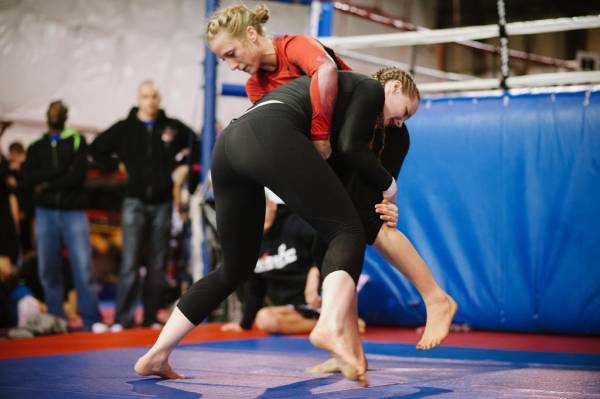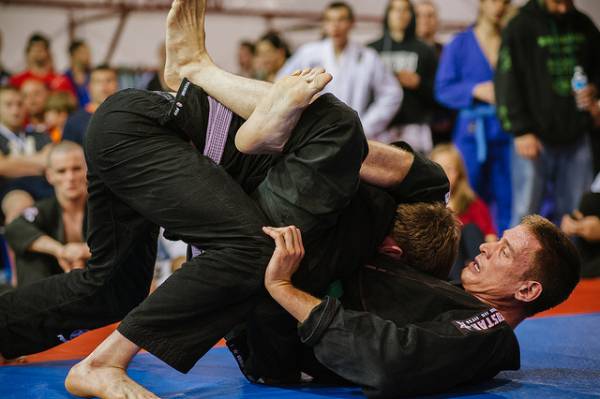Here’s my opinion as a strength and conditioning expert and a BJJ practitioner: Most Brazilian jiu jitsu competitors should not cut weight. <strong”>Instead, they should improve their strength-to-weight ratio over time.
In BJJ, Strong Is Relative
In BJJ, a competitor does not need to be as strong as possible. What a competitor needs is to be strong for their weight.
Strength is relative to the sport. For example, a competitor who competes in the lightweight division has a maximum allowed body weight of 167.5lbs at the time of weigh-in. If that competitor can deadlift 350lbs, then he is very strong. Take that same competitor and enter him into a powerlifting contest, and he is not even close to the top. BJJ athletes do not need to set world records in powerlifting. They just need to be strong relative to other competitors in the same weight class.
RELATED: Why You Shouldn’t Cut Weight for BJJ
The difference between cutting weight and changing strength-to-weight ratio is time. Cutting weight is a rapid reduction in body mass, normally done over the last week or two before a competition. Improving body composition is the reduction of body fat and/or the increase in strength over a longer period of time.
“BJJ athletes do not need to set world records in powerlifting. They just need to be strong relative to other competitors in the same weight class.”
The Impact of Conditioning and Effects of Dehydration
First and foremost, a competitor needs good technique. After mastering good technique, a competitor then needs conditioning. The mistake most people make is they associate conditioning and cardiovascular training. An example of this is a competitor who runs or does sprints to “improve conditioning.”
In fact, I think most people’s definition of conditioning is narrow. I like to define conditioning as the ability to do work. A BJJ competitor needs to be able to do work in multiple areas. During a match, a competitor taxes every major energy system of the body and will need to switch between the different energy systems multiple times.
LEARN MORE: Understanding Energy Systems: ATP-PC, Glycolytic, and Oxidative
The ability of a competitor’s aerobic and anaerobic system to perform is dependent upon hydration and nutrition. According to Medicine & Science in Sports & Exercise, dehydration of up to 4.8% of body mass resulted in a significant reduction in the ability to perform a resistance exercise bout.1
In addition to negatively affecting resistance training, dehydrating can reduce aerobic capacity. A large rise in core temperature during exercise in the dehydrated state is associated with a bigger catecholamine response. A large catecholamine response may lead to increased rates of glycogen breakdown in the exercising muscles, which can contribute to earlier onset of fatigue during prolonged activity.2
All this to say, dehydration can have a deep impact on the competitor’s body, and the smarter route to take is to plan ahead and work on increasing the strength-to-weight ratio. Here are four steps for working on this relative strength.

Step 1: Build Muscle
Instead of thinking about reducing your body weight, start thinking about building muscle. Building muscle will raise your metabolic rate resulting in more calories burned at rest. Building muscle also improves your work capacity.
Think of strength as the base of the pyramid. Let’s say you start your program being able to squat 135lbs for 2 reps and 50lbs for 20 reps in 30 seconds. After twelve weeks you can squat 165lbs for 2 reps and 60lbs for 20 reps. You are now stronger and can perform more work over a given period of time.
Step 2: Be Specific With Your Training
Getting stronger will not make you better at BJJ. It will make you stronger in the positions you need for BJJ. So, pick a few techniques that you like and combine them together into a circuit.
Example circuit:
- 1 minute hip escapes
- 1 minute mount escapes
- 1 minute triangles
- 1 minute sprawls
Your circuit length should equal your match length. If your match length is five minutes, then your circuits should be five minutes. By training in specific BJJ movements and in the appropriate timeframe, your body will build endurance in a specific way.
Step 3: Pay Attention to Your Nutrition and Performance
You cannot out-train a bad diet. Your goal is to reduce body fat and build muscle, and nutrition plays a key role in this process.
“If the way you are eating is helping improving your energy and performance, then keep it.”
The hard part is figuring out what is best for you. Nutrition is specific to the individual. A food that makes one competitor feel great can make another feel awful. The months leading up to a tournament are the best time to experiment with your nutrition. Spend some time figuring out what works well for your body. Pay attention to how you feel and perform, not to what others say works for them.
If the way you are eating is helping improving your energy and performance, then keep it. If it is not, then make small changes until you find your groove. You will be surprised how much better you feel when you are eating to build muscle instead of not eating in the hopes of making weight.
Step 4: Push the BJJ Hard
Supplemental training does not replace BJJ. If you have to choose between a BJJ session or a weight training session, always choose the BJJ session. Brazilian jiu jitsu training ties everything together. Your strength will get tested in a specific way. Your endurance will be pushed and technique will be improved.
Your goal is to build the specific strength and endurance needed during a match. As your body starts to build muscle and get in shape, the harder and more frequently you can roll.

The End Result
The end result from adding strength training, BJJ-specific drills, and nutrition together is a body that is leaner and stronger. Your body will be prepared for anything that gets thrown its way at a tournament.
RELATED: How Long Do You Want to Do BJJ? Training for Longevity
In the months leading up to the tournament, you will have fueled your body properly and built both strength and conditioning. The week before the tournament is not the time to change anything. The way you eat during training has given your body the ability to perform. Do not take that ability away by depleting yourself of water and food in the attempt to make weight.
During a tournament, you are going to be required to roll multiple matches. All the work you did to build strength and specific endurance leading up to the tournament will separate you from the rest. As you approach the later rounds and competitors who cut weight are starting to fade, you will be rest assured that you have something left in the tank. To you, it’s just another day at the academy.
References:
1. Judelson, D., “Effect of Hydration State on Strength, Power, and Resistance Exercise Performance.” Medicine & Science in Sports & Exercise, 1817-1824.
2. Jeukendrup, A. and Gleeson, M., “Dehydration and its effects on performance.” Human Kinetics .Retrieved October 30, 2014.
Photos courtesy of David Brown Photography.






